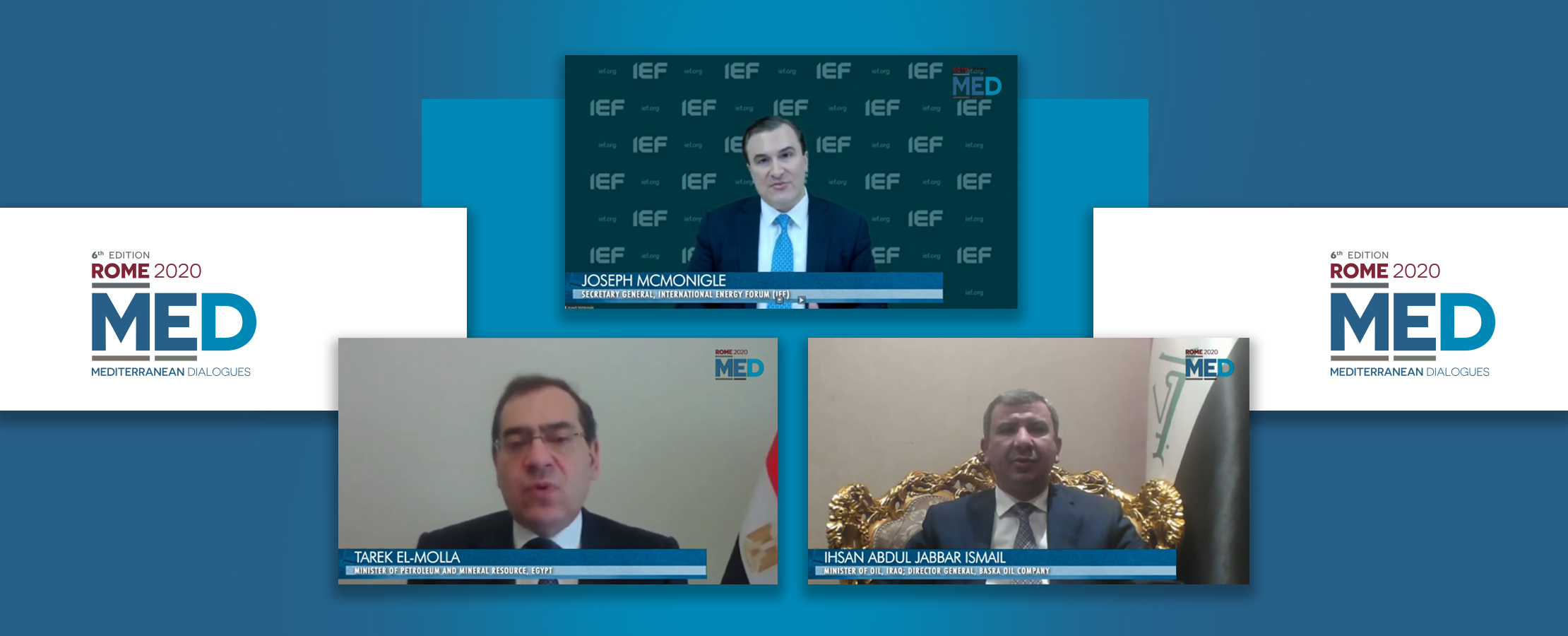MED 2020 - 6th Rome Mediterranean Dialogues
Rome, Italy
Joseph McMonigle, Secretary General of the International Energy Forum (IEF), engaged alongside Tarek El-Molla, Minister of Petroleum and Mineral Resources, Egypt and Ihsan Abdul Jabbar Ismail, Minister of Oil, Iraq and Director General, Basra Oil Company in a panel discussion at the 6th Rome Mediterranean Dialogues hosted by Rome, Italy on 30 November 2020. Entitled "Beyond the Shock: Rethinking the Energy Industry after COVID-19," the panel discussion focussed on two main topics:
- The impact of COVID-19 on the development of energy agendas at the international and domestic level.
- The impact of COVID-19 on energy transitions and how industry and governments can work towards a carbon neutral future.
Mr McMonigle emphasised the importance of maintaining energy security and market stability in a time of uncertainty due to the COVID-19 pandemic. This has raised both challenges and opportunities. On one hand, the demand shock has exacerbated an investment crisis that pre-dated COVID-19 which risks a supply shock in the future. On the other, there is greater policy momentum towards emissions reductions and louder calls for smart energy transitions as part of a green recovery in major economies.
As a result, countries must balance two priorities. First, reduce emissions and increasing affordable access and second, meet growing energy demand while achieving shared climate and development goals. International and domestic energy strategies based on maintaining this balance provide a starting point for countries to navigate energy strategy in a time of uncertainty, he added.
Part of this balance includes incorporating clean technologies such as Carbon Capture Use and Storage, and the role of hydrogen in the Circular Carbon Economy, adopted by the G20, and net zero strategies pursued by the European Union and other major economies. These technologies can accelerate fuel-switching and create synergies to integrate renewables, green gas, hydrogen, and various carbon dioxide solutions.
While the movement towards sustainable, affordable, and inclusive energy transitions continues, Mr McMonigle highlighted that more investment in conventional hydrocarbons than 2020 levels will be needed to prevent higher prices and increased market volatility in the future. This will be especially important at a time when governments and consumers are already feeling the economic impacts of reduced revenues. More importantly, increased investments in non-OPEC supply will be required as pent-up demand returns as part of a post-COVID recovery. The absence of such investment risks a future supply shortage that can threaten future market stability that will benefit neither producers nor consumers.
The Mediterranean Dialogues is the annual high-level initiative promoted by the Italian Ministry of Foreign Affairs and International Cooperation and the Italian Institute for International Political Studies (ISPI) in Rome with the aim to rethink traditional approaches to the area with and draft a new “positive agenda” that addresses shared challenges at both the regional and the international level. Launched in 2015, MED has quickly become the global hub for high–level dialogues on the broader Mediterranean engaging prominent leaders of Mediterranean governments, business, civil society, media, and academia.






